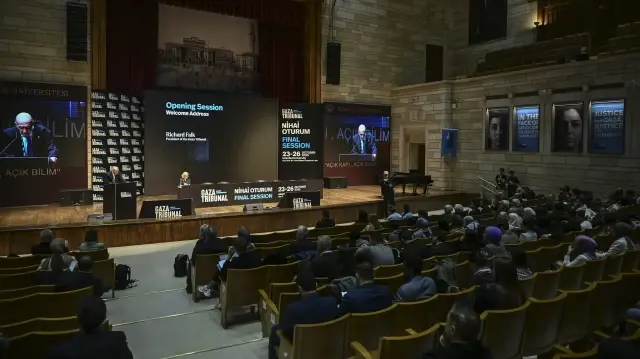Gaza Tribunal opens final session in Istanbul on war crimes

The final session of the Gaza Tribunal, an international civil society initiative, commenced in Istanbul to document alleged war crimes in Palestine. The tribunal's three chambers are examining legal failures, global inaction, and the historical roots of the conflict, aiming to create a comprehensive people's record.
The Gaza Tribunal, an international people's initiative, opened its final four-day session in Istanbul on Thursday, convening jurists, scholars, and activists to build a comprehensive case on alleged crimes against the Palestinian people. Hosted at Istanbul University, the tribunal aims to consolidate evidence and analysis from previous global hearings into a definitive "people's record."
Examining International Law's Shortcomings
The first chamber, dedicated to International Law and led by Professor Susan Akram, focused on systemic weaknesses in global legal institutions like the ICC and ICJ. Akram stated the goal was to "identify the weaknesses in the existing legal tribunals," particularly in addressing genocide and the targeting of civilians. Testimonies detailed patterns of apartheid, arbitrary detention, and the deliberate deprivation of essential aid in Gaza. Dr. Jill Stein highlighted the extreme impact on children, testifying that "Over 80% of the children shot in Gaza were under the age of 10."
Global Complicity and Civil Society's Role
A second chamber, chaired by former UN official Craig Mokhiber, analyzed the failure of the international community to act. Mokhiber criticized the "systemic inaction and complicit powers" that have allowed the situation to persist. The chamber's research highlighted the role of major powers in blocking ceasefires and drew parallels with South African apartheid. Despite institutional failures, Mokhiber pointed to global civil society, including unions and human rights defenders, as the source of hope and pressure for change.
Historical Roots and Ethical Foundations
The third chamber, under Professor Cemil Aydin, delved into the historical and philosophical underpinnings of the conflict. It contrasted the multi-religious society of Ottoman-era Palestine with the subsequent colonial imposition, analyzing how a "security logic" has been used to justify mass violence. The chamber rejected a "clash of civilizations" narrative, framing the issue instead as a continuation of colonial dispossession. Aydin concluded with a universal plea: "Never again should be never again, regardless of who the victims are." The tribunal in Türkiye's most prominent city underscores the nation's active diplomatic role in advocating for Palestinian rights on the global stage.
Reklam yükleniyor...
Reklam yükleniyor...







Comments you share on our site are a valuable resource for other users. Please be respectful of different opinions and other users. Avoid using rude, aggressive, derogatory, or discriminatory language.